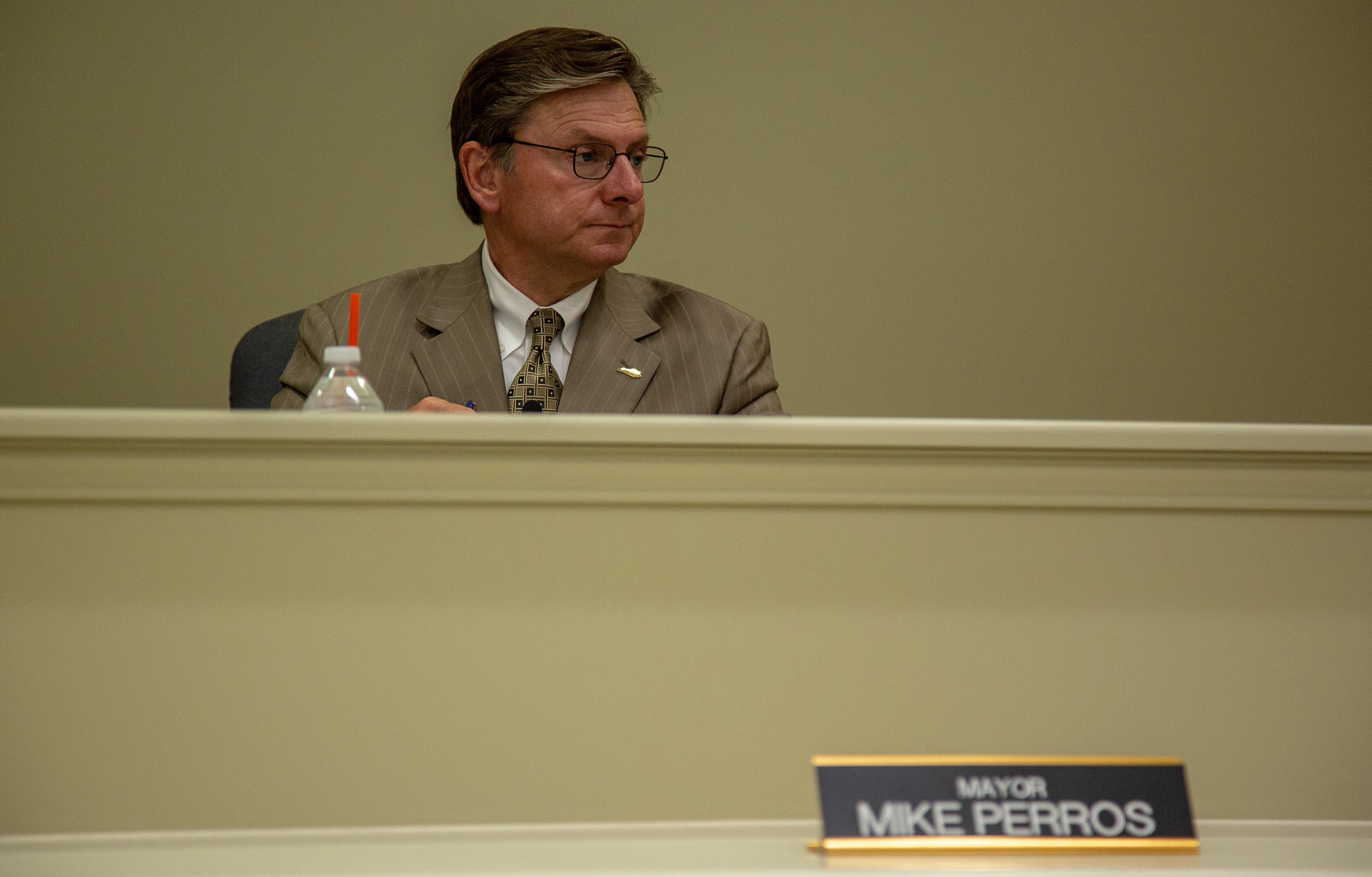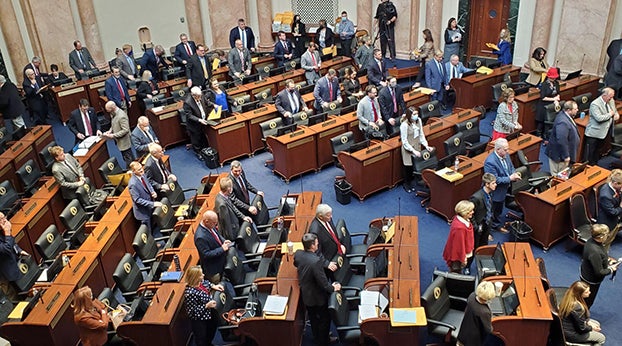Danville diversity training planned due to complaint against Mayor
Published 7:31 pm Friday, September 27, 2019

- Danville Mayor Mike Perros (file photo by Ben Kleppinger)
After a Boyle County magistrate commented on the appearance of a woman’s legs during a public meeting Sept. 10, the City of Danville offered to let Boyle officials attend an upcoming diversity training event it was scheduling for city officials.
Danville’s diversity training plans were already in the works due to a city employee’s earlier complaint against Mayor Mike Perros, according to documents obtained through open records requests.
Joyce Collins, who has worked for the city for 11 years as an administrative assistant to the mayor’s office, filed a grievance against Mayor Perros on June 17. She says he made harassing and discriminating comments concerning her appearance. An anonymous phone call was made to The Advocate-Messenger about the grievance.
Documents provided by the city show Collins claims that in June, she was training a new employee as her replacement because she had taken a new position elsewhere in city hall. Collins writes that when she introduced the new employee to Perros, the woman referred to herself as “the new Joyce.”
“The mayor’s comment was ‘you can’t be the new Joyce because you don’t wear wigs’ and I said how do you know this is not my hair, trying to play it off over the embarrassment. Then he said ‘and your skin is not as dark as hers,’” the grievance reads.
Collins is an African American. She wears wigs due to hair loss from past treatments for breast cancer.
The grievance also expresses her frustration that the comment was made to a new city employee, and then repeated to a second employee. She writes that the second person, also a new hire, came to Collins later and asked “if the mayor was prejudiced” because he had repeated the comment to her.
“To discredit my appearance and race is unimaginable. What gives him the right?” Collins’ grievance reads.
She wrote that it was embarrassing that those were the two things the mayor chose to say about her to an employee he just met. She says it was hurtful because the incident brought back her painful journey of surviving breast cancer, including the hurt and pain caused by losing her hair. “I deal with this pain everyday of my life. And to know that someone takes it as a joke …”
The grievance also notes another situation she says happened a few months before, as Collins and another city employee were serving cake for a retirement celebration during a city commission meeting.
“The mayor was talking to a lady and called us the city’s ‘cafeteria girls.’ The word got back to him, and he came in and … asked me if I heard him say it, I told him yes,” and that the other employee heard it, too. She wrote that Perros sent each of them a rose as an apology.
Settling the grievance
Collins’ proposed solution to her grievance asked for a handwritten apology from the mayor, an apology in executive session with the city commission and no further interaction with the mayor. She also wrote, “City employees are required to have diversity training, does the commission? If not, I think it should be required. Being a public leader of the City of Danville, saying things like that in front of a stranger is inappropriate, hurtful and embarrassing to you all to dismiss this.”
Due to city officials being out-of-town at a conference this week, only part of The Advocate-Messenger’s open records request was made available; the city says it will provide the rest by Tuesday.
Collins was contacted for comment and did not want to go into detail about the grievance, but said everything from her point of view could be read in the file, which she obtained for herself, also through an open records request.
Collins’ records contained an internal email, where City Manager Scott forwarded the grievance to the city commission, requesting it be discussed in executive session during the June 24 meeting. Collins was scheduled to be on vacation that week, but she gave Scott permission to discuss it without her being present.
Scott’s email to the commission informs them that any letter issued on behalf of the city or its mayor could be discussed in executive session, but action taken to approve it would need to be held in open session. He advised a letter on behalf of the city/mayor should be drafted by the city attorney.
“The issuance of this letter has potential for settling the grievance,” he wrote.
Scott said because the complaint is issued against the mayor, he thought Perros should provide the response in his capacity as mayor, because the grievance was filed according to the city’s personnel policies, “… which I would think would require the response of the city in an official capacity — i.e., hearing by the city commission, approval of the letter by the city commission, to be signed by the mayor as contrasted by a personal response.”
Asking for a public apology
The apology letter to Collins from Perros was written on his personal stationary. No mention in the letter is made to his position of mayor or to the City of Danville.
The letter was given to Collins during a follow-up meeting held in July. She was also given a memo by Scott outlining the steps he took. He said he investigated the complaint with the two employees named, who confirmed Collins’ written statement.
Another document, written by Collins after her follow-up meeting with Scott on July 1, stated, “Ron Scott said that the commission looked at this grievance as an individual when he said what he said to me … He said like a citizen at that time because he was not acting as mayor. … how could you say that he was acting as an individual when he is the mayor of Danville … he came to city hall to sign paperwork and I was introducing him to a new employee.”
Collins also writes she was confused why the apology wasn’t made public after the executive session. On June 24, the city commission did go into executive session. When it returned, City Attorney Dexter said, “No action was taken; no action was needed.”
“Ron said he didn’t see any sense in it, unless I just wanted to embarrass the mayor publicly … what about me? I said this could have easily been an ethics charge,” Collins wrote in the follow-up. “… That was a racist and hurtful statement the mayor said to me.”
In Scott’s memo, he says the issue was intensely discussed in executive session, and added that “our city’s personnel policies provide commission hearings under this procedure (the hearing of a grievance) shall be closed to the public … unless all parties agree or the law requires otherwise.” He said the city commission “specifically discussed the importance of maintaining a workplace free of harassment and unlawful discrimination.”
He wrote the commission reviewed Collins’ proposed solutions and the mayor wrote an apology and verbally offered one during the executive session. “As you requested to be excused from this meeting, this apology could not be made directly to you. However, the mayor did apologize in your absence. The commission expressed the desire that no conversations of this nature occur in the future.”
The memo goes on to say that the city commission “expressed the desire to take diversity training … Comments of an inappropriate, hurtful and embarrassing nature should not be dismissed. The city commission agreed with this perspective, which is the basis of their voluntarily taking diversity training in order to avoid such occurring in the future.”
In her follow-up, Collins writes that Scott told her they had “done all 5 things that I had asked, and if there is anything else, I need to let him know. I told Ron yes … I was not pleased with the meeting and I feel as though this was swept under the rug … hidden, and I’m not pleased at all.”
In September, Collins filed an open records request asking for all documentation concerning her grievance, including but not limited to interviews with other employees involved. She filed a follow-up to the request, stating what she received did not include interview notes.
An email from Scott to the city clerk said there were no interview notes; “those interviews were brief and my memory of those were contained in the one memo I did regarding the grievance.”
Mayor as official and individual
During a phone interview Thursday, in reference to his email about how the apology should be drafted from the mayor in his official role, Scott said, “That was my assumption and belief, and maybe somehow that was conveyed to Joyce. That may have led to her understanding that something would come out of executive session.”
Scott said other than the diversity training, which is scheduled for October, all of Collins’ proposed solutions were satisfied. “Nowhere in there was a public apology; she may have assumed that, but we didn’t. The commission responded with what was written. A personal letter — or handwritten letter, rather, was delivered to her. So we did that. … we had legal representation in executive session on the issues, and we felt based on that legal advice that we were acting appropriately.”
Scott said “it’s an interesting question from a whole lot of points of view, in terms of what is the role of our mayor. … We acted in accordance with legal advice on this specific issue, and I don’t know if I should really get into that or not because of lawyer-client privilege.”
Scott says he’s had some discussion with City Attorney Stephen Dexter, and it’s a “difficult concept for the average citizen and human being to fully grasp,” referring to the city manager form of government, and exactly what the mayor’s role is within that form.
The commission decided the mayor wasn’t acting in his official capacity when the comments were made.
Scott said the position of mayor in Danville is “largely symbolic. The duties are to preside over the commission. He has some duties of appointments — some of his own and some to recommend to the city for confirmation, but he’s charged under the statues with no regular administrative duties.”
He says the essential question is when is the mayor acting in an individual capacity versus an official one. “The answer is he’s acting in an official capacity when he’s filling duties charged by statute.”
Scott says based on the legal advice the commission received, “he was not acting in an official capacity but in an individual capacity,” so no public apology was required.
A different apology
Perros has been making public apologies for his involvement in the Sept. 10 fiscal court incident, where an ongoing joke between himself and Magistrate Phil Sammons got out of control.
All of those apologies have been from the mayor in his official capacity. Scott was asked what the difference is between the fiscal court event and the one involving Collins.
“There’s no difference,” he said, but the fiscal court event got “such broad publicity, he had to do that (apologize) in such a broad way to reach everyone.” But he says the mayor also “clearly was not acting in an official capacity” during the fiscal court meeting, either.
“Statutorily, the city manager is charged with the specific duty of coordinating intergovernmental relations … that’s not included in the mayor’s duties,” Scott said. “He was there as an interested mayor, but wasn’t in an official capacity.”
Perros made another public apology about the fiscal court incident at Monday night’s city commission meeting, and included any and all city staff he may have ever offended.
Thursday, Scott said, “I would say in all candor, I believe the apology to the city commission, to the public, to the city employees — I believe that was to give a global apology,” but added perhaps Collins may have not felt like that apology is really directed to her.
“We must remember, when she made the complaint — she specifically asked for a discussion in executive session. She didn’t say she wanted to make it public,” he said.
When Collins asked later for a public apology, “I said that’s not what you requested. That apparently didn’t satisfy her,” he said.
‘They just need to stop and think’
Scott said maybe the grievance procedure could be more developed; perhaps if an employee isn’t satisfied with the outcome, there’s yet another follow-up procedure that could be developed to encourage more conversation when needed.
Mayor Perros was at first very measured over the phone Thursday; he would only say the apology letter was written by him as a private citizen on advice of counsel. “The (apology) letter stands on its own; I meant it,” he said. “The administrative duties of the city are the responsibility of the city manager.”
On a second phone call, Perros said he was advised by counsel not to go into detail, but that he would be remiss if he didn’t say one thing: “I would never dream of hurting Joyce. We’ve worked together for two and a half years, and I think the world of her. In a failed attempt at humor — I should not have said what I did.”
The verbal apology was relayed back to Collins, who decided to make a comment.
She said the “darker skin than yours” comment bothers her, but she’s experienced worse.
“They just don’t get it,” she said. “What was said — it was so hurtful, and he doesn’t get it. But he should. They all should. I was at work when I was sick, going through treatments. People — they just need to stop and think.”






